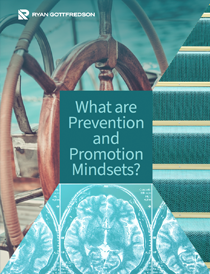What are Prevention & Promotion Mindsets?

Research Summary of the Effects of Possessing Either Fixed or Growth Mindsets

Fortunately, we have 30+ years of academic research on prevention and promotion mindsets that have been able to clearly demonstrate the effect these mindsets have on how we operate. This research has repeatedly demonstrated that those that have a promotion mindset think and process much more effectively than those with a prevention mindset in three primary ways.
First, a promotion mindset positively influences how we interpret situational cues.




